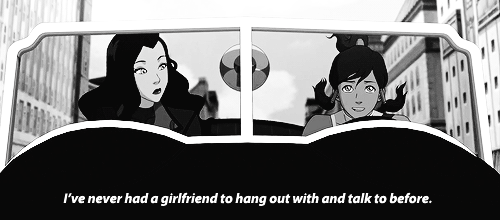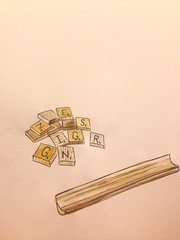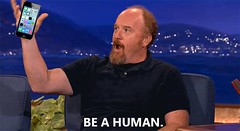By Guest Contributor Eric Anthony Glover, cross-posted from Midnight Breakfast
Some months after I’d come out as queer to my friends and family, I happened upon a Louis C.K. meme about anti-gay rights advocates—particularly those who argue they shouldn’t have to expose their children to same-sex marriages. The meme’s caption read, “Two guys are in love but they can’t get married because you don’t want to talk to your ugly child for f*ckin’ five minutes?” As much as I’d like to tell that you that straight allies don’t deserve cookies and congratulations for exhibiting the bare minimum of human decency, I’d be lying if I said C.K.’s words didn’t move me. After years of shaming from straight people, whether in purposely oppressive ways or indirectly cruel ones, it always strikes me as miraculous when some of them support my cause—especially if they’re cultural icons. And given the thousands of Likes and Shares the Louis C.K. meme received, I’m guessing his words touched a few others, too. Thing is, I doubt it would have gotten as much mileage if the caption had included C.K.’s full quote: “… Who f*ckin’ cares about your sh*tty kid? He’s probably a faggot, anyway.”
On the one hand, I personally find the punchline funny: it subverts the sentimental direction of the setup, makes fools of the people he’s frustrated with, and arguably turns the word “faggot” into a weapon against them. On the other hand, it’s not the only time C.K. has used the slur for a laugh, and he hasn’t always been so progressive while doing it. Louis C.K. follows a similar pattern with the word “nigger,” insightfully addressing the horrors of racism in some of his stand-up, but gluttonously employing the epithet for amusement in other instances. And it’s not as if he does so without racial awareness, either; despite being half-Latino, C.K. has publicly acknowledged looking white, identifying as white, and benefiting from white privileges — such as never being marginalized enough for slurs like “cracker” to truly hurt him. As a black man with the opposite experience, I find myself on edge whenever I hear him speak. Although I haven’t forgotten his beautiful bits bashing racial prejudice, I have to remember that he’s prone to blurting “nigger” at whim, and doesn’t always care to add a constructive reason.
In his defense, C.K. does seem conscious of the harmful, emotional repercussions that charged language can have on historically oppressed groups. Take the deeply moving opening of Louie‘s first season episode, “Poker/Divorce.” In the intro, C.K. — who plays a version of himself in the series he writes and directs — gets into a discussion with his comedian friends over whether it’s ethical to casually use the word “faggot” in his stand-up. His gay comic buddy Rick Crom explains how hearing the slur could affect some of his fans:
“You might want to know that every gay man in America has probably had that word shouted at them while they’re being beaten up. Sometimes many times. Sometimes by a lot of people, all at once. So when you say [faggot], it kind of brings that all back up.”
I, myself, have heard “faggot” used by loved ones even after they understood the terror and struggle of my coming out process. Like C.K., they never said it with the intent to hurt me, but the impact remained the same. “Faggot” is connected to my darkest moments of self-loathing and a lifestyle of unending panic between them. “Faggot” is my body literally shaking at the idea of being exposed; it’s crying myself to sleep after getting the wrong kind of erection; it’s knowing that, should I marry a man, only certain immediate relatives would show up. “Faggot” is being convinced, to the core, of lacking goodness—and resigned to the idea of never deserving any.
As convenient as it would be to suspend those feelings — whether for a loved one who can’t grasp how much it hurts you, or for the sake of a comic trying to get a laugh — the pain doesn’t stop whenever straight people decide it should. And they certainly don’t get to dictate the prescription. More often than not, when I hear fans defend C.K., they firmly position him as the solution, not the problem. He’s forcing us to confront our demons. Re-exposing us to uncomfortable topics. Pushing us to recognize the absurdity of prejudice.
Except queer folks like myself live in constant awareness of the cultural cancers and destructive attitudes directed toward us for existing. When Louis C.K. “investigates” a queer issue, we’ve long lived it. And even if C.K.’s comedy is then meant for “educating” heterosexuals, I fail to see how loosely using “faggot” helps build bridges or foster more understanding. Despite all the attempts of fans to rationalize and justify his use of slurs, there remains the distinct probability that C.K. has said “faggot” simply because he wants to.
In 2010, C.K. said on NPR’s Fresh Air that the “Poker/Divorce” scene was based on a conversation he had with Crom in real life, at the age of twenty-two—and that he since “never forgot” how “devastating” it can be for queer people to hear the word “faggot.” In the same interview, Fresh Air‘s host asked him in what context the slur is ever appropriate for stand-up. This was C.K.’s response:
“Well, I feel like when I get asked that, I get defensive about it. I start saying, ‘Oh, well, no,’ it’s okay that I say ‘faggot’ because this or that,’ but to be really honest with you, I’m not sure why I say it… I feel like I’m not sure I should be saying it… There are times I go, ‘Is this okay, really?’ What does it mean that I’m hurting people that I don’t know, like, who are watching me on TV?… And is it okay to hurt people?… Sometimes I think it is. Sometimes I think it isn’t … I’m not sure why I’m so often disgusting on stage. I don’t always know where it comes from.”
Aside from the fact that “sometimes” he feels okay hurting people, the NPR interview confirms an even more discouraging detail about C.K.’s madness: there’s not exactly a method to it. All too often, my apologist friends argue that C.K. gets a pass on certain words because he’s being analytical, subversive, intellectual, etc., but the comedian has admitted that there’s no consistently calculated intent behind his slur usage—at least when it comes to “faggot.” And in any case, his most assertive justification for saying it –which surfaced in his 2008 routine, Chewed Up — isn’t particularly profound. Despite the entertaining exposition behind his stance, C.K.’s overall argument for using “faggot” is the same any middle-schooler, modern rapper or common conservative would use to save face: “faggot” doesn’t mean anything homophobic to him. Therefore, the people it affects most shouldn’t be so sensitive to it.
 But even if his argument in Chewed Up were convincing, C.K. has still contradicted it. Take his 2009 act, Hilarious. In one routine, C.K. describes a character archetype he used to see in English period films as a “faggy lord with a ruffled shirt.” He then does an impression of what the male archetype would say, clearly suggesting that the character is attracted to other men. “Faggot,” in this instance, is deliberately tied to the homophobic connotation C.K. has said he’s never attached to the slur.
But even if his argument in Chewed Up were convincing, C.K. has still contradicted it. Take his 2009 act, Hilarious. In one routine, C.K. describes a character archetype he used to see in English period films as a “faggy lord with a ruffled shirt.” He then does an impression of what the male archetype would say, clearly suggesting that the character is attracted to other men. “Faggot,” in this instance, is deliberately tied to the homophobic connotation C.K. has said he’s never attached to the slur.
The bit from Hilarious reinforces a simple truth: separating slurs from their cultural baggage is difficult work—both for the oppressing group and for its historical victims. Obviously, expecting marginalized individuals to simply turn off their sensitivity at the drop of a hat—even for the sake of comedy—is a sometimes impossible request. Insisting to queer or black communities that “faggot” and “nigger” should be severed from the emotions they trigger is like shoving a man’s head into toilet water, growing indignant about his squirming and yelling, “Breathe, already! There’s plenty of oxygen in that H2O!”
Of course, hearing Louis C.K.’s multiple pro-gay bits dulls the edge that comes with his affinity for “faggot.” And it seems that C.K. has resolved to no longer use the slur in further stand-up, according to his response in a 2011 Reddit Q&A. Although it’s nice to hear he’s likely retired the word, it’s still unsettling that it took him a full two decades to do so after his seminal talk with Crom. And while he’s been making up his mind on the matter, he’s given less progressive fans years of fodder for justifying slur usage. C.K. addressed the issue in the same Reddit Q&A:
Q: How do you feel about people using your stand-up as an excuse to say “nigger” and “faggot”?
Louis C.K.: yeah i don’t know. ive seen that happen and it doesn’t make me really… so happy all the time. But that’s them. I did those bits as a kind of analysis of the words and what feelings they bring and how they’re used. I was playing with some fire. It was interesting. I think that the discussion of the word faggot that I did in the [Crom] scene was a bit of an evolution. I pretty much never say faggot on stage anymore. It’s just worked it’s way into and out of my act. it’s not interesting anyomre and i”m not goign to say it just to say it. Nigger … still pretty interesting. [sic]
What C.K. has contributed to the analysis of “nigger” is beyond me — as is the idea that “nigger” is somehow less worthy of C.K.’s “evolution.” Equally over my head is whatever rationalization C.K. has for saying the slur “just to say it,” or for being unconcerned that others use his bits to do the same. “But that’s them,” it seems, is C.K. shirking responsibility when misguided fans burn others using the fire he plays with. And although “analysis” would of course be useful if it yielded any thought-provoking results, it’s difficult to tell what new information C.K.’s “nigger” musings have uncovered.
Much like my reaction to the word “faggot,” “nigger” (or “nigga”) is usually cause for extreme discomfort, even when the term is used without malicious intent. Several white friends throughout my life have failed to grasp the heart-in-throat anxiety the phrase can provoke in the moment, and I’ve reminded them to use the “N-word” euphemism or omit “nigga” from the rap lyrics they recite. Although I used to figure the word’s gravity spoke for itself, some of my white peers — just like C.K.—have proven that using slurs is a higher priority than preventing black pain.
 Admittedly, C.K. has not only performed excellent bits acknowledging the unfairness of racial injustices, but he’s also uttered “nigger” in some of his comedy out of relative necessity. In Chewed Up, for instance, he addresses why the “N-word” phrase offends him more than the actual word “nigger,” arguing that the euphemism is simply “white people getting away with saying ‘nigger.’” Because of the bit’s dependence on differentiating between the two phrases, being confined to using “the N-word” alone would hamper his ability to get his point across with efficient comic timing. Using “nigger” in this portion of his routine has, at the very least, more grounds than none.
Admittedly, C.K. has not only performed excellent bits acknowledging the unfairness of racial injustices, but he’s also uttered “nigger” in some of his comedy out of relative necessity. In Chewed Up, for instance, he addresses why the “N-word” phrase offends him more than the actual word “nigger,” arguing that the euphemism is simply “white people getting away with saying ‘nigger.’” Because of the bit’s dependence on differentiating between the two phrases, being confined to using “the N-word” alone would hamper his ability to get his point across with efficient comic timing. Using “nigger” in this portion of his routine has, at the very least, more grounds than none.
Later on in the bit, he explains a time he thought of a white person as a “nigger” — and in a positive context — once again asking the audience to humor him in separating slurs from their traditional connotations. Further along in Chewed Up, he even uses “nigger” and “faggot” to describe a deer that hit his car, perhaps harkening back to his conceit of using slurs as innocuous insults.
In the same vein, C.K.’s character in Louie uses “nigger” on stage in the episode “Country Drive,” where he discusses the absurdity of reading Mark Twainliterature to his daughter, due to “nigger” appearing “forty times a page.” Using “nigger” in the stand-up scene, rather than “the N-word,” arguably heightens the urgency of his conflict to the audience—and ultimately underscores how disgusting the word still is to him.
Unfortunately, despite the times C.K. has used “nigger” with some vague semblance of judiciousness, there have also been times when he’s used the word carelessly, and even gleefully. In the 2011 HBO TV special Talking Funny — in which C.K. converses with comedy icons Chris Rock, Ricky Gervais and Jerry Seinfeld — C.K. leaps at the chance to say “nigger” with virtually no prompting:
Chris Rock: [Louis C.K.] is the blackest white guy I f*ckin’ know. And all the negative things we think about black people, this f*cker …
Louis C.K.: (smiling) You’re saying I’m a nigger.
Later in the discussion, Seinfeld says that he personally never discovered the humor in the slur. C.K. replies that “it would be amazing” if Seinfeld came up with “a great nigger bit.” Additionally, C.K. laughs (and bonds with Gervais) over saying “nigger” even when he’s off stage.
During his appearance on a 2010 episode of The Opie & Anthony Show, a radio program on which the late Black comic Patrice O’Neal also appeared, C.K. pounces at the opportunity to use the word “nigger” where there is no invitation to do so. O’Neal is just wrapping up discussing the origin of “kike” as an anti-Semitic slur when C.K. interjects:
“You know where ‘nigger’ came from? Originally? There was some black guy bein’ a nigger. So they called him a nigger. He was being a real nigger, so they said, “What a nigger!” And that’s where it started… Just a guy who was being such a nigger that it f*ckin’ made someone say the word.”
In a 2011 episode of the same program, C.K., Opie and Anthony discuss the looming possibility of an Adventures of Huckleberry Finn edition being published without the word “nigger” in it. C.K. argues vehemently that the novel would be neutered of its purpose and social relevance if “nigger” were extracted, basing his argument almost entirely on the premise that the book’s major supporting character is named “Nigger Jim” — whose moniker, he asserts, testifies to America’s shameful racial history. C.K. is mistaken; “nigger” is only used as an adjective rather than a name for Jim in Twain’s classic. Despite C.K.’s misguided point, however, I actually agree with the undercurrent of his position: taking “nigger” out of Huckleberry Finn would be to deny the inhumanity of slavery in the time period Twain wrote about. But leave it to C.K.’s crass use of “nigger” to alienate me.
At first, his use of the word during the episode is somewhat bearable, given the perfectly legitimate context Huckleberry Finn provides. C.K. seems to relish saying “nigger” at every conceivable opportunity, but always in relation to Twain’s prose. Once he’s asked who was offended enough to invite censorship in the first place, however, C.K. replies, “Just niggers.” His joke plays “nigger” straight, plainly referring to blacks to win a quick laugh from Opie and Anthony.
Soon after, C.K. even goes out of his way to involve a black caller named Kyle in his “nigger” game. Minutes before Kyle dials in, C.K. recalls a time Ronald Reagan discussed Huckleberry Finn on live television and struggled not to say “Nigger Jim” on air — at least, according to C.K. In the comedian’s version of events, Reagan stumbled and said “um … Jim” instead, due to the difficulty of omitting the slur. Once Kyle is on the line, C.K. deliberately addresses him as “Um … Kyle” — effectively labeling Kyle a nigger, and chuckling with Opie and Anthony about it.
While it may have been within personal bounds to make on-air “nigger” jokes with O’Neal, with whom C.K. had an established rapport, publicly prodding a black stranger with “nigger” was deliberately destructive. Like other instances in which C.K. has used the slur, there was no “analysis” in denigrating Kyle, just a display of self-gratifying, vicious humor at a black man’s expense.
Strangely enough, C.K. feels the term “crack whore” crosses the line. In a 2013 Rolling Stone interview, he said how demeaning and hurtful the phrase can be, and stood up against name-calling:
Rolling Stone: You once told Howard Stern a story about an encounter with a crack whore who attempted to murder you.
Louis C.K.: … I do want to correct that. “Crack whore” were not my words. I don’t think there’s anything meaner you could call somebody. “Whore” is a really mean word for a prostitute; it’s the derogative. I made no judgment on that woman. She was just doing what she had to to supply her crack habit, but that doesn’t make her a crack whore.
Rolling Stone: The part where she teamed up with a dude to try and kill you, maybe you can judge her on that.
Louis C.K.: I can judge her on it, but not as a “whore.” That was just rude.
 For whatever reason, C.K.’s sympathetic thought process regarding “whore” doesn’t apply to “nigger,” although he apparently has a capacity for protecting people from “mean” language. Perhaps it’s outweighed by his anxiety over “nigger” and a resulting compulsion to explore it, but as possibly the most powerful comedian on Earth, it stands to reason that he could be more careful with his catharsis, and more compassionate toward his black fans.
For whatever reason, C.K.’s sympathetic thought process regarding “whore” doesn’t apply to “nigger,” although he apparently has a capacity for protecting people from “mean” language. Perhaps it’s outweighed by his anxiety over “nigger” and a resulting compulsion to explore it, but as possibly the most powerful comedian on Earth, it stands to reason that he could be more careful with his catharsis, and more compassionate toward his black fans.
I suppose, if nothing changes, that I could simply stop listening to what he has to say. Maybe I will someday, if his material ever becomes too much overall. But I hope I don’t have to. Several times over, I’ve seen a comedian of conscience and conviction surface during C.K.’s stand-up, bent on panning prejudice and poking fun at privilege. His frustration with racism and homophobia are so humanely and hilariously articulated that it could be a waste to give up on him entirely. It’s just a shame that right now — unlike his whiter, straighter fans — I often have to choose between his comedy and my comfort. If C.K. ever sought to change that, his actions would not only be kinder, but braver:
“I sometimes say terrible things ‘cause it’s funny to me. It just makes me laugh to say ‘AIDS.’ I know, it’s childish, right? And the word ‘nigger’ just makes me laugh. It just does. And it’s a terrible word and I think that all of us, all of us that use it ironically and think that we’re not being racist are fooling ourselves. Because say it to a black guy with your little ‘goatee irony’ and see how funny he thinks that shit is. It’s cowardly, and I’m definitely a part of that cowardice.”
– Louis C.K. at Comedy Death Ray, 2006
As of now, C.K. is comfortable saying “nigger” to his heart’s content, on stage and off. And all the while, his liberal fans insist on giving him a pass due to his progressive stances. His condemnation of racism and homophobia proves he may not be doing more harm than good, but it baffles me that he’s still willing to do harm as well as good. If he knows how nightmarish “nigger” and “faggot” can be when said by our enemies, then he knows that the black and queer communities shouldn’t have to endure the same from our allies. Instead, to my disappointment, C.K. and his supporters have mistaken acknowledging social ills as an excuse to copiously, carelessly indulge in them.
Eric Anthony Glover is a pop culture critic with lots of opinions. He urges you to agree with them. When he’s not exploring the intersection of entertainment and social awareness, you can find him indulging in sci-fi TV, involuntarily daydreaming, or pounding out his next action blockbuster.
Illustration by Kristen Tomanocy









 But even if his argument in Chewed Up were convincing, C.K. has still contradicted it. Take his 2009 act, Hilarious. In one routine, C.K. describes a character archetype he used to see in English period films as a “faggy lord with a ruffled shirt.” He then does an impression of what the male archetype would say,
But even if his argument in Chewed Up were convincing, C.K. has still contradicted it. Take his 2009 act, Hilarious. In one routine, C.K. describes a character archetype he used to see in English period films as a “faggy lord with a ruffled shirt.” He then does an impression of what the male archetype would say,  Admittedly, C.K. has not only performed excellent bits acknowledging the unfairness of racial injustices, but he’s also uttered “nigger” in some of his comedy out of relative necessity. In Chewed Up, for instance,
Admittedly, C.K. has not only performed excellent bits acknowledging the unfairness of racial injustices, but he’s also uttered “nigger” in some of his comedy out of relative necessity. In Chewed Up, for instance,  For whatever reason, C.K.’s sympathetic thought process regarding “whore” doesn’t apply to “nigger,” although he apparently has a capacity for protecting people from “mean” language. Perhaps it’s outweighed by his anxiety over “nigger” and a resulting compulsion to explore it, but as possibly the most powerful comedian on Earth, it stands to reason that he could be more careful with his catharsis, and more compassionate toward his black fans.
For whatever reason, C.K.’s sympathetic thought process regarding “whore” doesn’t apply to “nigger,” although he apparently has a capacity for protecting people from “mean” language. Perhaps it’s outweighed by his anxiety over “nigger” and a resulting compulsion to explore it, but as possibly the most powerful comedian on Earth, it stands to reason that he could be more careful with his catharsis, and more compassionate toward his black fans.